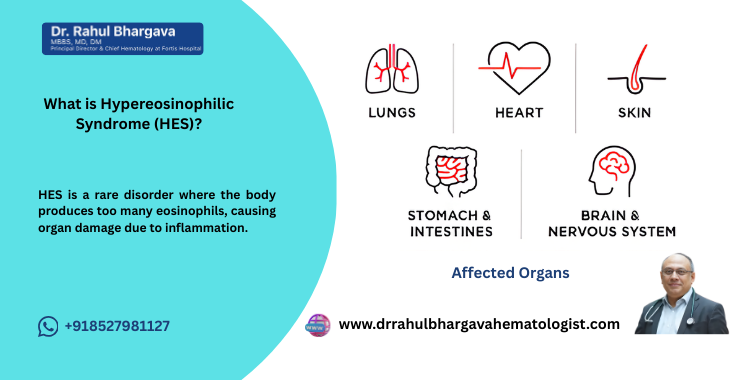Hypereosinophilic Syndrome (HES) Treatment in India

Hypereosinophilic Syndrome (HES) is a rare and chronic blood disorder characterized by an abnormally high level of eosinophils, a type of white blood cell, which can cause inflammation and damage to multiple organs. If left untreated, HES may lead to serious complications involving the heart, lungs, skin, and gastrointestinal system. India offers world-class treatment for HES under the guidance of leading hematologists like Dr. Rahul Bhargava, who provides a comprehensive and individualized approach to managing this complex condition. Diagnosis typically includes blood tests, bone marrow examination, genetic studies, and imaging to evaluate organ involvement. Treatment options range from corticosteroids and immunosuppressive drugs to targeted therapies like tyrosine kinase inhibitors, and in advanced cases, bone marrow transplant. India’s healthcare infrastructure, expert care, and affordability make it a top destination for patients seeking quality treatment for HES, with cost savings of up to 70% compared to Western countries.
Overview of Hypereosinophilic Syndrome (HES):
Hypereosinophilic Syndrome (HES) is a rare, chronic blood disorder characterized by an elevated number of eosinophils, a type of white blood cell, in the blood and tissues. These elevated levels can cause inflammation and damage to various organs, leading to a range of symptoms and complications.
Dr. Rahul Bhargava, one of India’s leading hematologists, offers specialized care for patients with HES. With years of experience and a patient-centric approach, Dr. Bhargava ensures comprehensive treatment tailored to each individual’s needs.
Types of Hypereosinophilic Syndrome:
HES can be classified into several types, based on the underlying causes:
- Primary HES: Caused by genetic mutations in eosinophils or other blood cells.
- Secondary HES: Triggered by other conditions like infections, allergies, or cancers.
Symptoms of Hypereosinophilic Syndrome:
The symptoms of HES vary depending on the organs affected and the severity of the condition. Common symptoms include:
- Fatigue and weakness
- Skin rashes or itching
- Respiratory issues, such as coughing or shortness of breath
- Gastrointestinal symptoms like pain or diarrhea
- Unexplained weight loss
- Heart complications (in severe cases)
- If you experience any of these symptoms, especially in combination, it’s crucial to seek medical attention promptly.
Diagnosis of Hypereosinophilic Syndrome:
Diagnosing HES involves a combination of clinical evaluation, blood tests, and imaging studies. Dr. Rahul Bhargava employs advanced diagnostic techniques to accurately identify HES, including:
- Complete Blood Count (CBC): To measure eosinophil levels.
- Bone Marrow Biopsy: To examine the bone marrow for abnormal cells.
- Genetic Testing: To detect mutations associated with HES.
- Imaging Studies: Such as CT scans or MRIs to assess organ involvement. Early diagnosis is key to managing HES effectively and preventing long-term damage to vital organs.
Treatment Options for Hypereosinophilic Syndrome:
The treatment of HES is tailored to the type and severity of the condition. Dr. Bhargava’s approach often includes:
- Corticosteroids: To reduce inflammation and lower eosinophil levels.
- Immunosuppressive Therapy: To control the immune system’s overactivity.
- Targeted Therapy: Such as tyrosine kinase inhibitors (TKIs) for patients with specific genetic mutations.
- Biologic Agents: Monoclonal antibodies that specifically target eosinophils.
- Bone Marrow Transplant: In severe cases, a bone marrow transplant may be considered.
Cost of Treatment and Stay in India:
India offers cost-effective and high-quality treatment for Hypereosinophilic Syndrome (HES). The expenses depend on the severity of the condition, type of treatment, and duration of hospital stay.
- Initial Consultation: Around USD 50–100 or INR 4,000–8,000.
- Hospital Stay: Costs range from USD 100–300 per day or INR 8,000–24,000 per day, depending on the facility and services.
- Medications: The cost of corticosteroids, immunosuppressive therapy, or biologic agents can vary between USD 200–1,000 or INR 16,000–80,000, depending on the type and dosage.
- Bone Marrow Transplant (if required): Estimated at USD 20,000–30,000 or INR 15,00,000–25,00,000.
Overall, treatment for HES in India is significantly more affordable compared to Western countries, making it a preferred destination for international patients seeking quality care.
Frequently Asked Questions
HES is a rare blood disorder marked by high eosinophil levels that can damage organs through inflammation and immune system overactivity.
Diagnosis typically includes a complete blood count, bone marrow biopsy, genetic testing, and imaging studies to determine organ involvement and underlying causes.
Treatment includes corticosteroids, immunosuppressive therapy, targeted drugs (e.g., TKIs), biologic agents, and in some cases, bone marrow transplantation.
Yes, treatment in India is significantly more affordable, with medication and hospital costs up to 70% lower than in Western countries.
Dr. Rahul Bhargava is one of India’s leading hematologists, known for his expertise and personalized treatment plans for HES and other rare blood disorders.